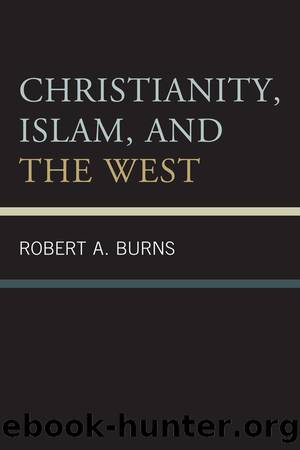Christianity, Islam, and the West by Robert A. Burns

Author:Robert A. Burns [Burns, Robert]
Language: eng
Format: epub
Publisher: UPA
Published: 2011-01-15T00:00:00+00:00
Chapter Eleven
Western Muslims
TARIQ RAMADAN AND REFORMIST ISLAM
Tariq Ramadan is Professor of Islamic Studies, currently teaching on the faculty of Theology at Oxford University. He is also Visiting Professor at Erasmus University in the Netherlands; Senior Research Fellow at St. Anthonyâs College, Oxford University, and Doshisha University, Kyoto; and president of the University Think Tank Network in Brussels. He is author of numerous books including To Be a European Muslim(1999) and Western Muslims and the Future of Islam (2004).1 Ramadan points out that Muslim communities in the West are living through a veritable silent revolution since more and more young people are actively seeking to live in harmony with their faith while at the same time living in modern secular societies. Beginning with the message of Islam and its universal principles, Ramadanâs analysis of Islamic teaching leads to a movement of reform and the manner in which one can integrate into this new environment. It is by acquiring the conviction that they can be faithful to the principles while being totally involved in the life of their societies, Ramadan believes, that Muslims in the West will be able to come to terms with this new situation.
In Western Muslims and the Future of Islam, Ramadan writes:
This book is only one step more toward the building of the Muslim personality in the West and doubtless in the modern era too. It will not be the last. Other works, in sha Allah (God willing) must continue to trace the path back to the beginning. I have humbly tried to draw the theoretical and practical outline of a vision of the future, full on. I want to engage with this in practice, and already, across all the countries of the West, this vision is being accomplished. The road is still long, but indwelt by this humble âneed of him,â one must not be afraid or apologize for needing time.2
Ramadan belongs to the Salafi renewal movement begun by Jamal al-Afghani who died in 1887. This movement encouraged Muslims to oppose the colonial domination imposed by Western nations (e.g., Britain, France, Holland) on Islamic countries but did not put the blame on the Western powers for the lack of creativity of the Muslim world. Al-Afghaniâs movement did criticize the individualism, materialism, and secularism resulting from Western modernity, but its main thrust was on the need for Muslim self-criticism. Al-Afghani argued that the principal reason for the decline of Muslim societies was the stagnation of Islam, its indifference to social inequality, its conservatism, and its suspicion of modern science.
How did the stagnation occur? The answer deals with the collapse of the Abbasid dynasty which ruled the Middle East until 1248, which was the year the destructive invasion of the Mongols took place. The Abbasid dynasty was in power from 750 until 1258. In 1258, Hulagu, a grandson of Genghis Khan, attacked Baghdad and burned the city to the ground. He executed the last Abbasid caliph. The caliphate was transferred to Cairo where it ultimately failed. There was no longer a single voice of authority but Islam continued to expand.
Download
This site does not store any files on its server. We only index and link to content provided by other sites. Please contact the content providers to delete copyright contents if any and email us, we'll remove relevant links or contents immediately.
Phoenicians among Others: Why Migrants Mattered in the Ancient Mediterranean by Denise Demetriou(595)
american english file 1 student book 3rd edition by Unknown(590)
Verus Israel: Study of the Relations Between Christians and Jews in the Roman Empire, AD 135-425 by Marcel Simon(585)
Caesar Rules: The Emperor in the Changing Roman World (c. 50 BC â AD 565) by Olivier Hekster(569)
Basic japanese A grammar and workbook by Unknown(553)
Europe, Strategy and Armed Forces by Sven Biscop Jo Coelmont(512)
Give Me Liberty, Seventh Edition by Foner Eric & DuVal Kathleen & McGirr Lisa(491)
Banned in the U.S.A. : A Reference Guide to Book Censorship in Schools and Public Libraries by Herbert N. Foerstel(479)
The Roman World 44 BC-AD 180 by Martin Goodman(469)
Reading Colonial Japan by Mason Michele;Lee Helen;(462)
DS001-THE MAN OF BRONZE by J.R.A(458)
The Dangerous Life and Ideas of Diogenes the Cynic by Jean-Manuel Roubineau(451)
Introducing Christian Ethics by Samuel Wells and Ben Quash with Rebekah Eklund(446)
Imperial Rome AD 193 - 284 by Ando Clifford(445)
The Oxford History of World War II by Richard Overy(444)
Catiline by Henrik Ibsen--Delphi Classics (Illustrated) by Henrik Ibsen(416)
Literary Mathematics by Michael Gavin;(406)
Language Hacking Mandarin by Benny Lewis & Dr. Licheng Gu(400)
Brand by Henrik Ibsen--Delphi Classics (Illustrated) by Henrik Ibsen(377)
